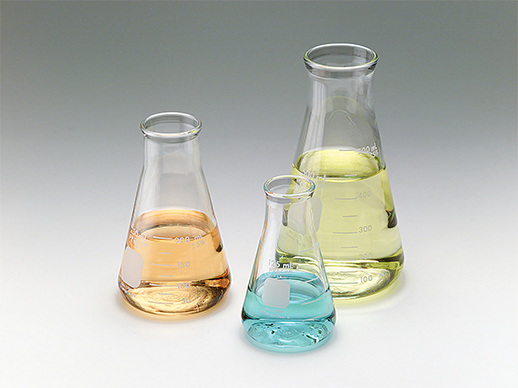| Composition: | Polyethylene glycol laurate |
| English name: | Polvethylene glycol laurate |
| Type: | Non-ionic |
| SPEC. |
Vist Insp (25℃) |
Acid value mgKOH/g |
Saponification value mgKOH/g |
content(%) |
HLB |
|
PEG200ML |
Clear to yellowish liquid |
≤ 5 |
140~155 |
≥99% |
9.5 |
|
PEG200DL |
Clear to yellowish liquid |
≤10 |
195~210 |
≥99% |
8 |
|
PEG400ML |
Clear to yellowish liquid |
≤ 5 |
90~110 |
≥99% |
13 |
|
PEG400DL |
Clear to yellowish liquid |
≤10 |
130~155 |
≥99% |
10.5 |
| SPEC |
Performance and application |
|
PEG200ML |
Dispersed in water, and minerals, vegetable oil forms a turbid liquid. Water- based coatings as defoamers. Viny| plastisol as a viscosity reducer, hair dye paste as a viscosity control additive, and also used as a paper softening additive, metalworking lubricant and textile lubricant emulsifier, coupling agent and solubilizer. |
|
PEG200DL |
Soluble in isopropanol, acetone, carbon tetrachloride, and other solvents, dispersed in water, used as a self- emulsifying auxiliary emulsifier and lubricant, mold release agent, viscosity control agent. |
|
PEG400ML |
Dispersed in water, with emulsification, and lubrication properties, latex paint as a lubricant, fiber processing as a lubricant and leveling agent, can also be used as a pigment grinding and dispersing agent, oil solvent solubilizer, viny| plastic sol anti- blocking agent, cosmetics and pharmaceutical emulsifier. |
|
PEG400DL |
Dispersed in water, with good bundling, antistatic, soft, smooth performance. Chemical fiber oil agent as an oil- soluble emulsifier, softener, lubricant, and antistatic agent. In the textile industry as a coupling agent, and lubricant. Metal processing as a degreaser, and coolant additive, can also be used as a paper release agent, and industrial or civil detergent. |
200KG iron drum/plastic drum, 50KG plastic drum, IBC, flexitank, tank car.
This series of products is non-toxic, non-flammable, according to the general chemical storage.it is transported as non-toxic and mon-dangerous goods, stored in a dry and ventilated place, storage period of two years.
Polyethylene glycol laurate can also be called polyethylene glycol lauric acid ester and polyethylene glycol monolaurate. 9004-81-3 is its CAS number. Specifically, it includes PEG200ML, PEG200DL, PEG400ML and PEG400DL.
The properties of PEG series derivatives are primarily influenced by two factors: the length of the polyethylene glycol chain (molecular weight) and the structure of the fatty alcohol chain (single or double chain). PEG200ML is formed by the condensation of low molecular weight PEG200 with a single-chain fatty alcohol. It exhibits excellent fluidity, emulsifying properties, and permeability, making it suitable for low-viscosity emulsions, cosmetics, and detergents. It rapidly disperses oily components while maintaining a lightweight formulation feel.
In contrast, the double-chain fatty alcohol structure of PEG200DL enhances lipophilicity, improving emulsion stability while reducing foam formation. It is suitable for formulations such as high-oil-content emulsions, fabric softeners, or industrial detergents, offering both dispersing capability and softening/defoaming effects.
PEG400ML, formed by condensing medium-molecular-weight PEG400 with a single fatty alcohol chain, exhibits slightly higher viscosity than PEG200ML, with enhanced emulsifying and moisturising capabilities. In cosmetic emulsions, skincare products, pharmaceutical ointments, and certain household formulations, PEG400ML delivers a more uniform and refined emulsion texture while balancing aqueous solubility and oil-phase dispersibility.
Finally, PEG400DL enhances oil-phase compatibility and emulsion stability through its double-chain fatty alcohol structure. It is particularly suited for formulations demanding high stability, low foaming, or prolonged emulsion life, such as premium skincare emulsions, fabric softeners, or industrial emulsification systems. Balancing dispersibility, stability, and softening properties, it represents an ideal choice for demanding emulsion systems.
